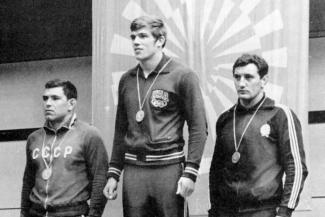NOVI SAD, Serbia (October 25) -- The U23 World Championships 2025 in Novi Sad will see four Freestyle weight classes -- 57kg, 70kg, 79kg and 125kg -- in action on day six.
WATCH LIVE | LIVE MATCH ORDER | DAY 5 RESULTS
14:00: Abolfazl MOHAMMAD NEZHAD (IRI), a world U20 silver medalist, reaches the semifinals at 125kg in Novi Sad after an 8-0 win over Khachatur KHACHATRYAN (ARM).
13:40: Luke LILLEDAHL (USA) got taken down by Milad VALIZADEH (IRI) for the opening score in their match but Lilledahl comes back and scores three takedowns to lead 6-2 at the break. He keeps the momentum going in the second period and beats Valizadeh 11-5 at 57kg.
13:25: Levi HAINES (USA) is on a mission here. He blanks Aykan SEID (BUL), 10-0, in the 79kg quarterfinals and powers his way into the semifinals.
13:10: PJ DUKE (USA) was challenged a little by Kaito MORITA (JPN) but he uses a big four-pointer to win 7-3 and advance to the semifinals at 70kg.
12:55: Milad VALIZADEH (IRI) had to wait for it but he beats Luka GVINJILIA (GEO), 12-2, at 57kg. Solid gut-wrench from Valizadeh to win his bout.
12:40: U20 world champion Luke LILLEDAHL (USA) needed four minutes and 25 seconds to see off Honghang LIAO (CHN) at 57kg. Lilledahl is the favorite to capture the gold here in Nvoi Sad.
12:30: Yuta KIKUCHI (JPN) stars off with a 7-2 win against Vladyslav ABRAMOV (UKR) at 57kg. Very controlled win from the Japanese who has world champion Yuki TAKAHASHI (JPN) and Olympic champion Takuto OTOGURO (JPN) in his corner.
12:15: In a match between world silver medalist Levi HAINES (USA) and U20 world champion Mahdi YOUSEFI (IRI), Haines comes out on top 7-0. Yousefi completely shut down there in this 79kg bout.
11:45: Sina KHALILI (IRI) with a 12-2 technical superiority win over Naveen KUMAR (IND) at 70kg. That gu-wrench was very effective for Khalili.
11:40: PJ DUKE (USA) with a huge 10-0 win over Rostislav LEICHT (GER) at 70kg. He looks in top form and better than his run in Samokov where he won gold at the U20 World Championships.
11:25: Luka GVINJILIA (GEO) with an excellent strategy against recent U20 world silver medalist Sumit MALIK (IND). Gvinjilia scored a double leg attack and turned Malik twice to lead 6-0. Despite his strong efforts, Malik could only score 5 points and lost his 57kg bout 6-5
11:00: Sina KHALILI (IRI) hangs on to beat Omar OMAROV (UWW) 6-5 at 70kg. Both Omarov led 5-4 when Khalili forced a stepout with 24 seconds left. Omarov challenged the call for a par terre position but the challenge was lost, giving a 6-5 lead to Khalili. Omarov then tried two pushouts which were both called pushouts. Khalili survived there to win 6-5
10:50: Luka CHKHITUNIDZE (GEO) with a brilliant fireman's carry for four points against CHANDERMOHAN (IND) before he adds a huge reverse slam for a five points. A pushout to end the match 10-0 in two minutes and 18 seconds at 79kg.
10:35: U20 world champion PJ DUKE (USA) up against Begijon KULDASHEV (UZB) at 70kg. He gets a point for Kuldashev's passivity before scoring a takedown for two points and lead 3-0 at the break. A point for Kuldashev in the second period but Duke hits two takedowns and then defends to win 7-1.



Share your thoughts.
Comments